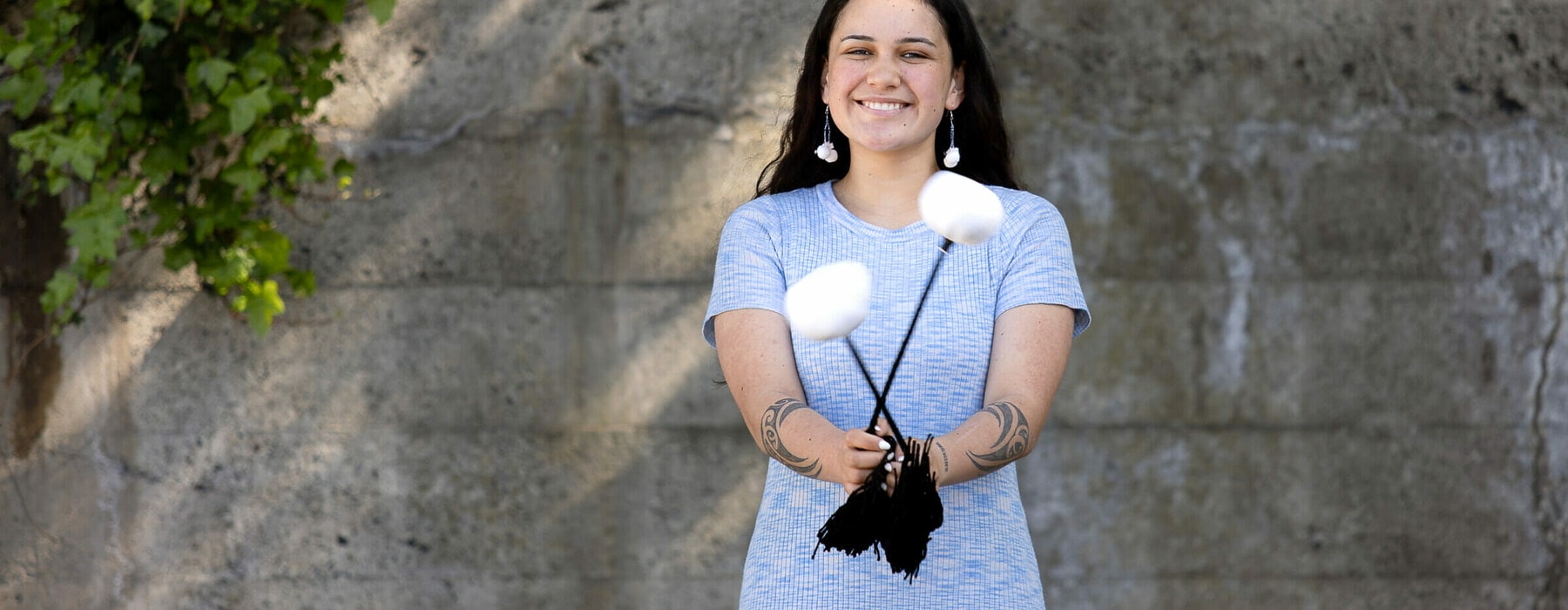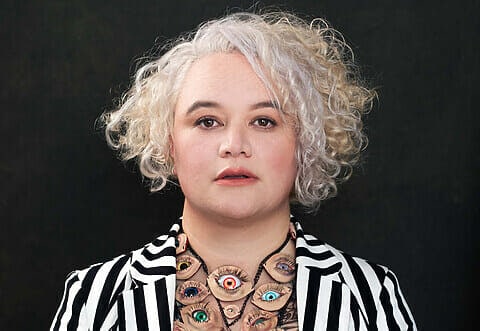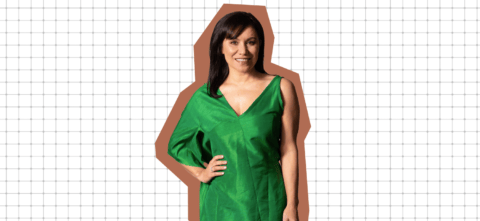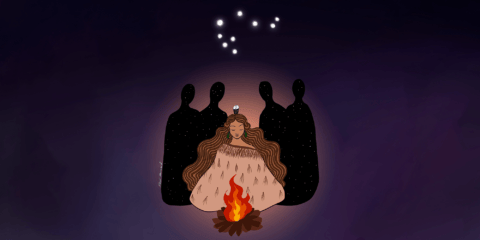Teenage poi entrepreneur Georgia Latu and her grandmother started to weep at the recent Women’s Rugby World Cup finals in Auckland, where a packed Mt Eden stadium witnessed New Zealand Black Ferns win the international tournament. But Georgia and her grandmother did not shed tears because of the Black Ferns’ triumphant victory. They cried because the thousands of supporters who filled the stadium were swinging poi that were made with love from Georgia’s Dunedin-based company, Pōtiki Poi.
“We were crying because we were seeing our poi that came from our shop being used. It was emotional to see thousands of people using them and respecting them.”
At 16, Georgia (Kai Tahu, Ngāpuhi) is the CEO of the largest poi manufacturing company in the world. She started the business when she was just 12 years old and earlier this year won the Young Māori Business Leader Award.
From humble beginnings, the business has grown immensely, supplying poi to more than 60 retail stores around the world, including 30 Countdown supermarkets, Te Papa and Waitangi museums and stores in Australia and Japan.
This year was her most successful year, after she secured the contract to supply poi for the Women’s Rugby World cup, which meant she had to make 30,000 pois in under three months.
We spoke to Georgia a week after the World Cup final in November, and the mammoth task has obviously taken its toll.
“Man, I’m exhausted. I never want to see the Rugby World Cup colours ever again,” the teenager laughs.
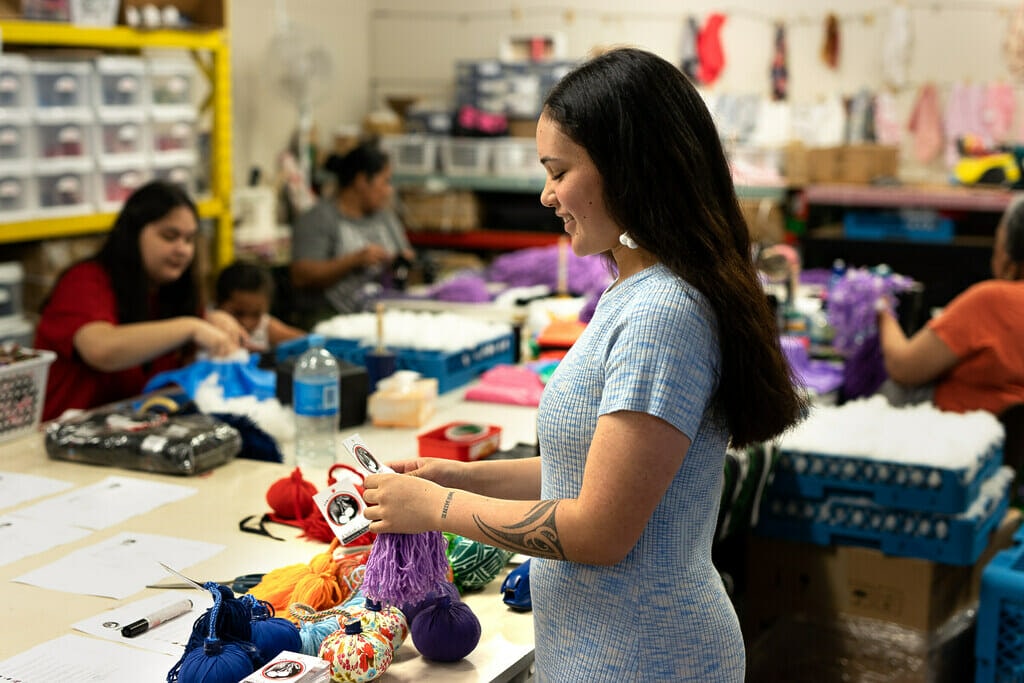
To honour the huge contract of 30,000 poi, Georgia employed 20 staff members and reached out for help from her local community in Dunedin. More than 200 volunteers, from community groups and schools, helped Georgia deliver the huge volume of poi – working shifts from 9am to 12pm – making 1000 poi per day to complete the order.
After seeing her poi being swung by rugby fans throughout the entire month-long tournament, and then seeing a packed Mt Eden stadium swing her creations to support the Black Ferns, Georgia knew that all of her hard work had been worth it.
She saw the international event as an opportunity to educate Aotearoa about the significance of the traditional Māori artform.
“This is a way to educate the world of what our poi are, and to uplift everyone. There’s not a better event to do this. Through this experience, Aotearoa know what poi are and know how to use them, how to look after them and how to respect them.”
Georgia, who grew up speaking Māori fluently and has attended total immersion learning at kōhanga reo and kura kaupapa, fell in love with the poi ever since she picked one up and swung it as a young child.
She started her business when she was just 12 years old after she made poi to help raise funds for a school trip. In three days, she made $1000 and she realised that there was a demand for this unique cultural product.
In her business plan, her goal was to walk into any shop across Aotearoa and see her poi being sold. Now that she supplies 30 Countdown supermarkets across Aotearoa, it has taken her four years to realise her dream.
She says people sometimes underestimate her because of her young age. But they only need to look at her success to know that she means business.
“Being a young Māori wahine in business, there are so many barriers already. I want to create change. If I don’t do it, then who will?”
She says being a successful businesswoman at 16 means she hardly has any time to hang out with friends and do the things that most teenagers do. In fact, some of her close mates are employed by her with a part time after-school job. But she says the sacrifices have been worth it.
“With Pōtiki Poi, I have time to create equality for our whānau and create change. That’s the wave I want to ride. I feel really humbled to be a part of history-making opportunities and revitalising our precious taonga Māori. We’ve never seen poi used in this way before. To be on that waka with my whānau and my community is amazing!”
“I don’t miss having free time because it’s filled with so many other cool opportunities. It can be hard when your friends are doing a lot of things and I’m missing out. But they know that I’m very busy and I have a lot on.”
A recent sudden death of a close friend her age, has made Georgia realise the importance of what she does. His death has given her more reason to fulfil her goals.
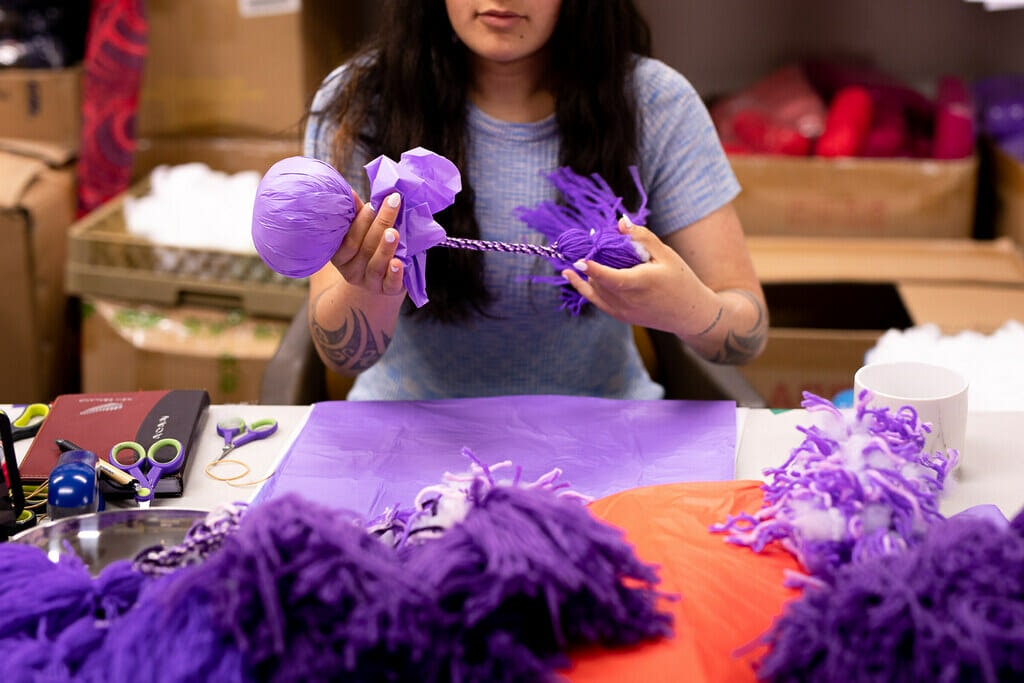
“It shocked our entire world. We weren’t ready for something like this to happen. I felt really confused and forced me to find different ways to move on. One way for me was my mahi. He’s given me this opportunity to honour him and the best way to do that is to continue to do the work that I’m doing.”
Pōtiki Poi has a poi making factory in Dunedin where around twenty staff members make the poi mostly with eco-friendly, second-hand materials to reduce its footprint on the environment. She also employs workers where this is their first time in employment.
Georgia truly has a small poi enterprise. She’s also written and self-published a book about the history of the poi and conducts Poi Hip Hop classes, a dance workout that incorporates poi to modern hip hop music. Her book, Ngā Mihi, was written during lockdown while Georgia was questioning whether her business would survive the pandemic.
“I became an official author and publisher at 15. A lot of people ask how you make and use poi? Actually, let’s go back to where they originated. It goes way back to our ancestor Tāne Mahuta and his journey in finding the right plants to create our poi. It’s about the whakapapa of poi and all the adventures Tāne Mahuta had and how he never gave up when he was faced with challenges.”
She says her business would not be the success it is today without the support from her whānau, especially her mother.
“My mum takes care of the finances, all of the accounting side. We also have a whānau full of accountants. I look after the face of Pōtiki Poi and am active on social media.”
Georgia’s love for poi stems from her love for all things Māori. She loves to perform the traditional art form on stage with her school kapa haka group.
“Poi is a way for me to express my taha wahine (womanhood). I love performing poi, I love making poi. I live and breathe it. For me, it’s a way for me to express who I am as Māori. I didn’t choose the poi. The poi chose me.”
This is public interest journalism made possible with the help of NZ on Air.

